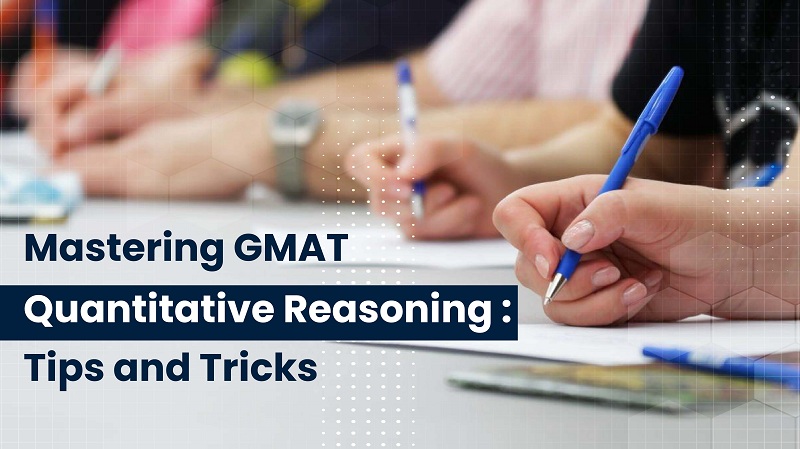Graduate Management Admission Test (GMAT) is a crucial step for those aspiring to pursue a Master’s in Business Administration (MBA) from overseas institutions.
It is widely accepted in different colleges as its multiple sections test your quantitative, analytical and written skills. The Quantitative Reasoning section assesses your ability to analyze data, interpret information, and solve mathematical problems. Sounds exciting? However, for many test-takers, this section can be challenging.
To help you ace this exam many GMAT institutes in Delhi are willing to guide you. With the right strategies and practice, you can master this exam and boost your score. In this blog, we will explore some practical tips for you to prepare for this exam and further your goals.
Table of Contents
1. Everything About GMAT
The first step before you delve into preparation mode would be to familiarize yourself with the structure of this examination. Consult the best GMAT coaching in Delhi, for any queries.
Highlights:
| Application fees | Approximately Rs. 21,000 ($275) |
| Duration of exam | 3 hours 7 min. |
| Mode of Exam | Computer-based |
| No. of attempts | 8 |
| Eligibility criteria | must be 18 years of age or above for applications without consent. You can still appear if you are 13-17 years, but you would need parental consent. You would also need a bachelor’s degree from a recognized institute. |
Exam pattern:
GMAT is composed of 4 sub-sections. Each section is timed with a fixed number of questions. Find the detailed overview below-
| Sub-sections | No. of Questions | Time frame |
| Analytical Writing Assessment | 1 | 30 min |
| Integrated Reasoning | 12 | 30 min |
| Quantitative Reasoning | 31 | 62 min |
| Verbal Reasoning | 36 | 65 min |
A candidate can sit for the GMAT exam a maximum of five times a year. However, remember that there needs to be a minimum gap of 16 days before you take your new attempt. The maximum number of times you can attempt is 8. You would be happy to note that there are no negative markings against incorrect answers. The overseas study consultants in Delhi can guide you through the process of registration and any challenges you face.
2. Mastering quantitative reasoning
The GMAT Quantitative Reasoning section tests your understanding of various mathematical concepts. Understanding these concepts thoroughly along with practice will save you time and increase your accuracy. The GMAT coaching in Delhi can give you detailed information regarding study materials and relevant mock tests.
Tips to score high in GMAT
- Consistent practice is the key to mastering this exam. You can refer to GMAT preparation materials and practice tests by GMAT classes in Delhi. Your focus should be on both problem-solving and data-sufficiency questions. As you progress with your speed and accuracy, try to increase the difficulty level of your questions.
- Time management– Your goal should be to solve questions within a set time frame. If you find a question too time-consuming, move on and you can revisit the leftovers once you have been through the entire paper. Remember, there is no negative marking, so you attempt all and even make an accurate guess. GMAT institutes in Delhi give you nuances on finding the right answers quickly to eliminate time constraints for you.
- Identify Patterns and Shortcuts: As you practice, look for patterns in certain questions and identify shortcuts to solve them. Recognizing these patterns will help you save time and help you improve accuracy. At GMAT institutes in Delhi, rigorous practice can enable you to discuss strategies with other students and you also find multiple tricks to boost your score.
- Eliminating plausible answers: The more you practice, the better you can identify answers. Challenging questions often require the process of elimination. Discard the options that you are sure of being incorrect, this can lead you to the right option.
- Review Mistakes: After each practice, learn from your mistakes through reviews. You can identify the areas where you went wrong, practise better and develop strategies to make it right. Faculties with years of experience in GMAT institutes in Delhi, can train you to review your mistakes.
- Simulate Real Exam Conditions: With the test day approaching, you need to take timed practice tests. Give dedicated 3 hr 7 min, with properly timed sections as per exam demand. This will help you get a hang of the pressure and time constraints. At GMAT institutes in Delhi, there are tests at regular intervals to keep you abreast with the competition level.
- Stay Calm and Confident: During the exam, if you encounter difficult questions, remember that one question does not determine your whole performance. Focus on your strengths and navigate through the whole paper. If time permits, you can attempt to solve the difficult ones.
3. Steps to register for GMAT:
You should ideally register for GMAT 2-3 months in advance of the planned date. Although you can register within 6 months or up to 24 hrs before the exam, it would be difficult to get a seat on such short notice. With guidance from the best education consultants in Delhi, you can register hassle-free.
For online registration, you can adopt the following steps:
- Sign up on mba.com
- You would find the register for the GMAT tab.
- Enter all relevant information and verify your profile.
- Schedule your GMAT
- Pay the registration charges.
Did you know that you can register for GMAT in 4 ways- Online, Phone, Postal mail and Fax? Register at your convenience with GMAT institutes in Delhi, for professional help.
Also Read: Is Pursuing MDS a Good Choice After Completing BDS?
Conclusion:
To master GMAT Quantitative Reasoning, you would need to consistently practice, develop an understanding of mathematical concepts, and effective time management. Follow the above tips and tricks, to improve your problem-solving skills, and approach the exam with confidence. Seek professional help from study abroad Delhi consultants for securing a top score. Remember that preparation is the key to success, so start early, stay focused, and aim for your best performance on the GMAT.
The exam is only a single criterion in the long application process. Take the guidance of student visa consultants in Delhi, to fulfil all application requirements.
FAQs:
- Is GMAT tougher than CAT?
CAT is tougher than GMAT due to its undefined syllabus. With the dedicated practice of a few weeks, you can score 700+ in GMAT.
- What is the eligibility for the GMAT exam?
There is no academic qualification, but you need to be above 18 years of age. For 13 to 17 years of age candidates, you would require parental consent for appearing in the exam.
- Can a weak student clear GMAT?
GMAT is a test of your mathematical, written English and reasoning skills. With practice, you can develop your attitude tuned to examination demand. Many students from non-English academic backgrounds have aced the GMAT through the correct approach and dedicated preparation.
- Which country accepts GMAT?
Countries like the USA, UK, Australia, Germany, Canada and many others accept GMAT test scores. Remember, to shortlist your destination, courses and college to ensure whether GMAT is accepted.
- How to prepare for GMAT?
GMAT has 4 sections that test your written, quantitative reasoning, analytical skills and verbal reasoning. To secure 700+ you need to practice by giving sectional mocks and full-length practice tests in a timed manner. Identify your strengths and weaknesses to implement better in the actual exam.




